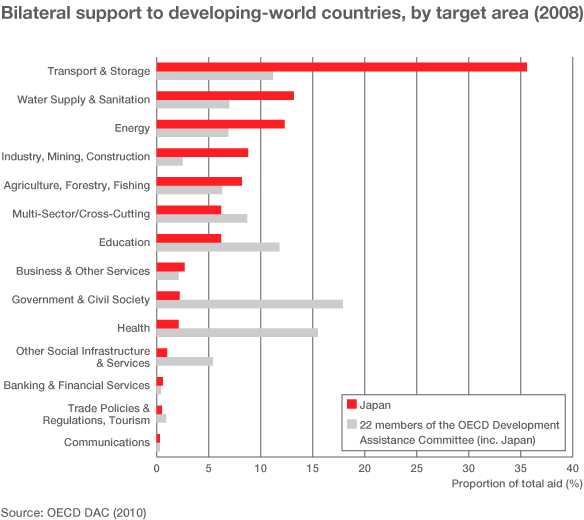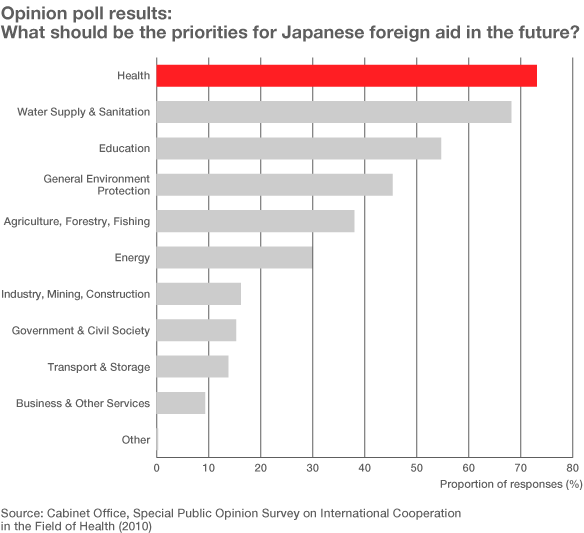
The Need to Increase Japan’s ODA Spending on Health
Politics- English
- 日本語
- 简体字
- 繁體字
- Français
- Español
- العربية
- Русский
Approximately $150 billion is spent on government-funded official development assistance in the developing world each year. The largest single donor country is the United States, which spends $28.3 billion every year. Japan’s annual ODA budget is about $15.6 billion a year.(*1) But this is equivalent to just 1% of the total government budget and Japanese spending on ODA (from the general account of the government budget) has decreased by half from its peak in 1997.(*2)
Health-related ODA amounts to just 2.1% of Japan’s total ODA spending, which is extremely low compared to the figure of 15.5% for the 22 members of the Development Assistance Committee of the Organization for Economic Cooperation and Development.(*3)) Japan also has bucked a general trend toward increased spending on health-related ODA in recent years: although spending internationally has increased fivefold over the past 20 years, Japanese funding has hardly increased since the late 1990s. Because of this, Japan risks forsaking a long tradition of leadership in global health and setting ODA priorities that are not popular with its people.

Japan’s Historical Contributions to Global Health
Historically, Japan has made many important contributions to global health. For example, Japanese doctors were instrumental in leading smallpox vaccination efforts after what turned out to be the final outbreak in 1978, culminating in the eradication of smallpox in 1980. Japanese doctors have also led efforts to eradicate polio, which are nearing success, and played a leading role in eliminating the disease from the Western Pacific region (achieved in 2000).
At the G8 summit held in Kyūshū and Okinawa in 2008, Japan called for greater international awareness of the importance of infectious diseases and made a significant contribution to the Global Fund to Fight AIDS, Tuberculosis, and Malaria. This group’s efforts have brought great benefits to the many hundreds of millions of people who live with the effects and threat of these three major infectious diseases.
Japan thus has a history as a leader in international ODA efforts in the healthcare field.
Making More of Japan’s Healthcare Achievements
Japan provides high-quality healthcare at low cost to its people and has one of the highest life expectancies in the world. The knowledge and expertise that has allowed the country to achieve this position is something of which the Japanese people should be proud. Japan’s achievements in healthcare have been so significant that in August 2011 the internationally influential British medical journal The Lancet ran a special edition on the Japanese healthcare system to mark 50 years of universal health insurance in Japan. This was the first time the magazine had run a special edition devoted to a single first-world country, and shows the significance of Japan’s achievements over the past 50 years. Japan is in a position to contribute internationally through sharing this Japanese way of doing things. We should be looking to provide leadership, and to become a major pillar of global health efforts.
Indeed, Japanese popular opinion supports this perspective: in a recent public opinion poll, fully 73.1% of Japanese people said they thought Japan should prioritize health issues in its ODA.(*4)
From a business perspective, too, healthcare is one of the world’s growth industries. Now is the perfect time to use Japan’s comparative advantage in the healthcare field to build a strategic development policy for Japan and make a contribution to the international community at the same time.

(Originally written in Japanese on May 20, 2013.)
(*1) ^ Statistics made public by the OECD DAC (2013). Figures provided are for 2011. The figures for Japan include special account budget spending and government loan and investments in addition to general accounts spending. Dollar-yen exchange rates calculated using an average of the official monthly rates published by the Japan Customs, available here.
(*2) ^ See this Ministry of Foreign Affairs page on the ODA budget, consulted May 20, 2013.
(*3) ^ OECD DAC (2010
(*4) ^ Cabinet Office, Special Public Opinion Survey on International Cooperation in the Field of Health (2010).
diplomacy politics foreign policy ODA development aid healthcare